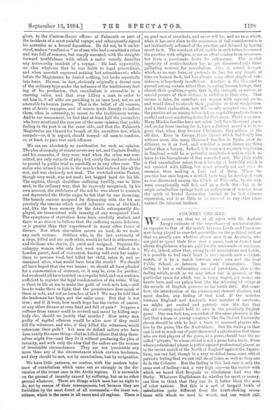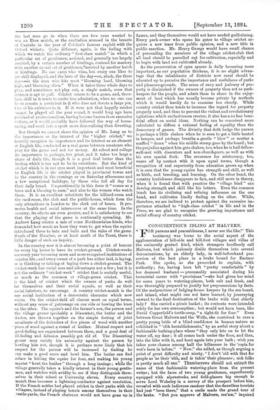COUNTRY CRICKET.
WE cannot say that we at all agree with Mr. Andrew Lang's estimate of the importance of cricket-matches as superior to that of the match between Lords and Commons now being played to crowded assemblies on the political field, or that we greatly care whether eleven men from Australia, who are paid to spend their lives over a game, beat or do not beat eleven Englishmen who are paid for the same waste of existence. We do, indeed, allow that, owing to old associations and habits, it is possible to feel one's heart in one's mouth over a cricket- match, if it be a match between one's own and the rival Public School, or between the rival Universities. This feeling is but a rudimentary sense of patriotism, akin to the feeling which, much as we may detest war in general, or the particular cause for which war is being waged, yet makes our hearts burn and our pulses beat like the whirring of wings at the records of English prowess on the battle-field. But some- how, the introduction of the professional element deadens, and must deaden, any feeling of that kind. If the matches between England and Australia were matches of amateurs, we might get excited and patriotic over the fact that the old country could hold its own in the peculiarly English game. One can feel, too, somewhat of the same pleasure in the fact that a team of young amateurs like the Oxford UniverSity eleven should be able to beat a team of seasoned players who live by the game, like the Australians. But the feeling in that salmis not so much one of patriotism-as of a satisfaction that those who are real players of the game, as a game, should beat the so- called "players," to whom cricket is not a game but a trade. Even where professional player is pitted against professional player, as in the recent match of the North of England against the Akistra- Hans, one can feel, though in a very modified form, some saft of patriotic feeling that we can still do at home as well as they can do in the Colonies. But the feeling in this last case is only the same sort of feeling—not a very high one—as. the sorrow with which we heard that Iroquois or Gladiatenr had won the Derby. Whatever Englishmen do, whether for sport or money, one likes to think that they can do it better than the men of other nations. But this is a sort of languid tickle of satisfaction quite different from the heart-choking sensa- tions with which we used to watch, and can watch still,
the list man go in when there are two runs wanted to win an Eton match, or the exultation aroused in the breasts of Cantabs in the year of Cobden's famous exploit with the Oxford wickets. Quite different, again, is the feeling with which we watch the ordinary "first-class match " in which a particular set of gentlemen, assisted, and generally too largely assisted, by a certain number of hirelings, contend for mastery with another casual set of gentlemen,'assisted by another batch of hirelings. No one cares who wins, but every one likes to see skill displayed, and the hero of the day—or, alack, the three tvs—is the man who hits most "blooming hard, blooming high, and blooming often." When it takes three whole days to play, and sometimes not play out, a single match, even that interest is apt to pall. Cricket ceases to be a game, and, there- fore, skill in it tends to excite less admiration, when no one can be or remain a proficient in it who does not devote a large per. to cm of his existence to it. If it were not that happily cricket cannot be played all the year round, it would long ago have perished of professionalism, having become barren from excessive culture, or it would probably have followed the way of horse- racing, and sunk into a sport more demoralising than diverting.
But though we cannot share the opinion of Mr. Lang as to the importance or the interest of the "higher cricket," we heartily recognise its importance and its interest as an element of English life, conducted as a real game between amateurs who play for the game and not for money. At school and college its importance is, perhaps, too great, and it takes too large a share of daily life, though it is a good deal better than the loafing which is too apt to be its substitute. But the kind of cricket which is in our eyes most important and most beneficial to English life is the cricket played in provincial towns and. in the country in the evenings or on Saturday afternoons and a few exceptional holidays, by those who toil all day for their daily bread. Unquestionably in this form it " comes as a boon and a blessing to men," and also to the women who watch them. It is an excellent substitute for the billiard-room and the card-room, the club and the public-house, which form the only attractions in London to the clerk out of hours. It pro- motes health and social intercourse at the same time. In the country, its effects are even greater, and it is satisfactory to see that the playing of the game is continually spreading. Mr. Andrew Lang relates a tale of some Northumbrian hinds, who demanded how much an hour they were to get when the squire introduced them to bats and balls and the rides of the game. South of the Humber, or at least south of the Trent, there is little danger of such an inquiry.
In the country now it is almost becoming a point of honour for every big house to have its cricket-ground. Cricket-weeks are every year becoming more and more recognised institutions of country life ; and every owner of a park has either laid, is laying, or is thinking or talking of laying down a cricket-ground. The cricket-week has social uses and advantages not a few ; but it is not the ordinary " cricket-week " cricket that is socially useful, so much as the common or village-green cricket. This is the kind of cricket which the owners of parks do well for themselves and their social equals, as well as their social inferiors, to encourage. A country cricket-match is the one social institution of a democratic character which now exists. On the cricket-field all classes meet on equal terms, without any sense of patronage on one side or bowing the knee on the other. The squire's and the farmer's son, the parson and the village grocer (probably a Dissenter), the butler and the doctor, are thrown together on the simple footing of joint assailants of the defenders of five pieces of wood with another • piece of wood against a round of leather. Mutual respect and good-feeling are engendered between them, and a good deal of ill-feeling and delusion possibly got rid of. The Dissenting grocer may satisfy his animosity against the parson by bowling him out, though it is perhaps more likely that his respect for the parson will be increased by finding he can make a good score and bowl him. The butler can find solace in hitting the squire for four, and making his young master "hunt the leather" through a long innings ; while the village generally takes a kindly interest in their young gentle- men, and watches with avidity to see if they distinguish them- selves in their school or University eleven. Every country match thus becomes a lightning-conductor against revolution. If the French nobles had played cricket in their parks with the villagers, instead of playing tennis among themselves in their castle-yards, the French chateaux would not have gone up in flames, and they themselves would not have needed guillotining. Every park-owner who opens his gates to village cricket ac- quires a new lease from public opinion, and a new title in public sanction. Mr. Henry George would have small chance of persuading the members of the village cricket-club that all land should be parcelled ont for cultivation, especially and to begin with land not cultivatea. already.
As the preservation of open spaces is daily becoming more important, as our population thickens, it is no slight advan- tage that the inhabitants of districts now rural should be educated up to perceive the importance and usefulness of parks and pleasure-grounds. The sense of envy and jealousy of pro- perty is diminished if the owners of property thus act as park- keepers for the people, and admit them to share in the enjoy- ment of land which has usually become private by methods which it would hardly do to examine too closely. While country cricket thus tends to increase the regard for property properly used, and thus to prevent the violent and revolutionary agitations which exclusiveness creates, it also has a no less bene- ficial effect on social ideas. Nothing can be conceived more calculated to diffuse a rational feeling of equality than the democracy of games. The divinity that doth hedge the parson is perhaps a little shaken when he is seen to get a little heated in temper, and perhaps breathe a gentle " blow " or mutter a muffled "damn" when his middle stump goes by the board ; but the prejudice against him gets shaken, too, when he is hail-fellow- well-met with dissenters and non-churchgoers, as well as with his own special flock. The reverence for aristocracy, too, wears off by contact with it upon equal terms, though a recognition of real superiority from education grows up when it is seen that the young squire has strength and skill, as well as birth, and breeding, and. learning. On the other hand, the country loutishness disappears in fact, and still more in theory, when it is found that with practice the "village hind" can develop strength and skill like his betters. Even the common lunch has its civilising and refining influences on the one hand, and cultivates kindly feeling on the other. While, therefore, we are inclined to protest against the excessive im- portance attached to "high-class cricket" in life and in the Press, we are glad to recognise the growing importance and. social efficacy of country cricket.



































 Previous page
Previous page